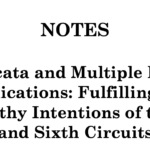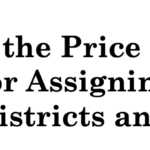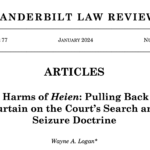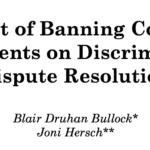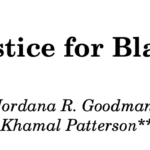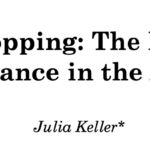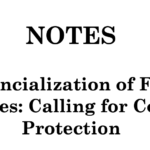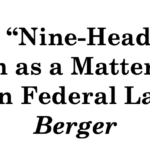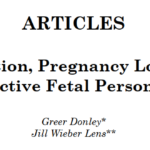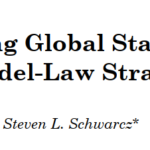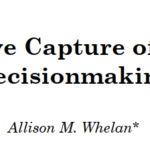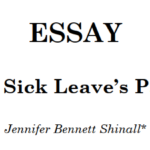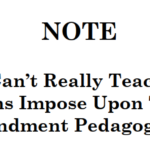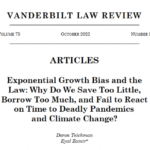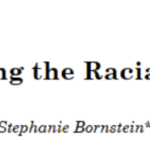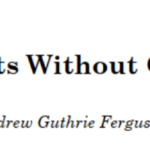Volumes Category
Res Judicata and Multiple Disability Applications: Fulfilling the Praiseworthy Intentions of the Fourth and Sixth Circuits
Mar. 20, 2024—Amber Mae Otto | 77 Vand. L. Rev. 561 In the United States, the application process to receive disability benefits through the Social Security Administration is often a tedious, multistep procedure. The process becomes even more complex if a claimant has filed multiple disability applications covering different time periods. In that circumstance, the question arises...
Efficiency at the Price of Accuracy: The Case for Assigning MDLs to Multiple Districts and Circuits
Mar. 20, 2024—Isaak Elkind | 77 Vand. L. Rev. 599 28 U.S.C. § 1407 allows for the centralization of unique cases into a single forum for pretrial purposes. The product is multidistrict litigation, known colloquially as the “MDL.” While initially conceived as a means of increasing efficiency for only particularly massive, complex litigation, MDLs have become pervasive....
The Harms of Heien: Pulling Back the Curtain on the Court’s Search and Seizure Doctrine
Jan. 26, 2024—Wayne A. Logan | 77 Vand. L. Rev. 1 In Heien v. North Carolina, the Supreme Court held that individuals can be seized on the basis of reasonable police mistakes of law. In an opinion authored by Chief Justice Roberts, the eight-Justice majority held that the Fourth Amendment’s prohibition of “unreasonable” seizures does not bar...
The Impact of Banning Confidential Settlements on Discrimination Dispute Resolution
Jan. 26, 2024—Blair Druhan Bullock & Joni Hersch | 77 Vand. L. Rev. 51 The #MeToo movement exposed how workplace harassment plagues employment in the United States. Several states responded by passing legislation aimed at curbing harassment and employment discrimination in the workplace. One of the most common legislative efforts was to ban confidentiality provisions in certain...
Access to Justice for Black Inventors
Jan. 26, 2024—Jordana R. Goodman & Khamal Patterson | 77 Vand. L. Rev. 109 To receive a patent, an inventor must meet certain inventive and procedural standards. Their invention must be novel, nonobvious, and written in such a way that any person skilled in the inventive subject can make and use the invention without undue experimentation. This...
Eavesdropping: The Forgotten Public Nuisance in the Age of Alexa
Jan. 26, 2024—Julia Keller | 77 Vand. L. Rev. 169 Always-listening devices have sparked new concerns about privacy while evading regulation, but a potential solution has existed for hundreds of years: public nuisance. Public nuisance has been stretched to serve as a basis of liability for some of the most prominent cases of modern mass-tort litigation, such...
The Financialization of Frequent Flyer Miles: Calling for Consumer Protection
Jan. 26, 2024—Ari Goldfine | 77 Vand. L. Rev. 233 Airlines’ frequent flyer programs operate more like a monetary system, with points as a form of currency, than a typical discount or rewards plan. In fact, airlines’ power over points is even more extensive than that of a central bank over currency—beyond simply determining how many points...
Avoiding a “Nine-Headed Hydra”: Intervention as a Matter of Right by Legislators in Federal Lawsuits After Berger
Jan. 26, 2024—Taylor Lawing | 77 Vand. L. Rev. 275 Heightened political polarization across the United States has resulted in the increased use of Rule 24(a) intervention as a matter of right by elected legislators in federal litigation concerning state law. Because states differ in their approaches to intervention, with only some states expressly granting intervention in...
Abortion, Pregnancy Loss, & Subjective Fetal Personhood
Nov. 22, 2022—Greer Donley & Jill Wieber Lens | 75 Vand. L. Rev. 1649 Long-standing dogma dictates that recognizing pregnancy loss threatens abortion rights—acknowledging that miscarriage and stillbirth involve the loss of something valuable, the theory goes, creates a slippery slope to fetal personhood. For decades, antiabortion advocates have capitalized on this tension and weaponized the grief...
Regulating Global Stablecoins: A Model-Law Strategy
Nov. 22, 2022—Steven L. Schwarcz | 75 Vand. L. Rev. 1729 Digital currencies have the potential to improve the speed and efficiency of the payment system. The principal challenge is retail: to facilitate day-to-day payments among consumers as an alternative to cash, both domestically and across national borders. Two models of digital currencies are becoming viable: central...
Executive Capture of Agency Decisionmaking
Nov. 22, 2022—Allison M. Whelan | 75 Vand. L. Rev. 1787 The scientific credibility of the administrative state is under siege in the United States, risking distressful public health harms and even deaths. This Article addresses one component of this attack—executive interference in agency scientific decisionmaking. It offers a new conceptual framework, “internal agency capture,” and policy...
Paid Sick Leave’s Payoff
Nov. 22, 2022—Jennifer Bennett Shinall | 75 Vand. L. Rev. 1879 Perhaps paid sick days have never been more valuable than during the COVID-19 pandemic. Yet even before COVID-19, seventeen states and the District of Columbia began passing legislative mandates that employers provide employees with paid sick leave (“PSL”) days. Most of this legislation requires employers to...
Can’t Really Teach: CRT Bans Impose Upon Teachers’ First Amendment Pedagogical Rights
Nov. 22, 2022—Mary Lindsay Krebs | 75 Vand. L. Rev. 1925 The jurisprudence governing K-12 teachers’ speech protection has been a convoluted hodgepodge of caselaw since the 1960s when the Supreme Court established that teachers retain at least some First Amendment protection as public educators. Now, as new so-called Critical Race Theory bans prohibit an array of...
Exponential Growth Bias and the Law: Why Do We Save Too Little, Borrow Too Much, and Fail to React on Time to Deadly Pandemics and Climate Change?
Oct. 20, 2022—Doron Teichman & Eyal Zamir | 75 Vand. L. Rev. 1345 Many human decisions, ranging from the taking of loans with compound interest to fighting deadly pandemics, involve phenomena that entail exponential growth. Yet a wide and robust body of empirical studies demonstrates that people systematically underestimate exponential growth. This phenomenon, dubbed the exponential growth...
Confronting the Racial Pay Gap
Oct. 20, 2022—Stephanie Bornstein | 75 Vand. L. Rev. 1401 For several decades, a small body of legal scholarship has addressed the gender pay gap, which compares the median full-time earnings of women and men. More recently, legal scholars have begun to address the racial wealth gap, which measures racial disparities in family economic security and wealth...
Courts Without Court
Oct. 20, 2022—Andrew Guthrie Ferguson | 75 Vand. L. Rev. 1461 What role does the physical courthouse play in the administration of criminal justice? This Article uses recent experiments with virtual courts to reimagine a future without criminal courthouses at the center. The key insight of this Article is to reveal how integral physical courts are to...
